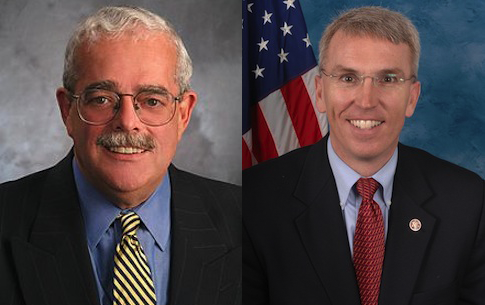A House oversight subcommittee hearing Wednesday revealed inefficiencies and paperwork burdens are holding back a government program that has dramatically helped businesses, according to testimony.
The hearing by the Subcommittee on Government Organization, Efficiency, and Financial Management analyzed the Trade Adjustment Assistance for Firms (TAAF) program. TAAF provides matching funding and strategic consulting to firms who have been harmed by liberalized trade policies that open America up to imports from cheaper markets.
"Trade liberalization leaves some behind," said Rep. Gerry Connolly (D., Va.) in his opening statement.
The three business leaders who addressed the committee were followed by three government officials.
The three business leaders were past participants in the program and spoke highly of it.
Drew Greenblatt of Marlin Steel Wire Products told the committee how the Atkins diet and cheap Chinese production destroyed his ability to make steel bagel baskets profitably. TAAF helped his business transition to custom, precision-engineered steel metal baskets for companies such as Toyota.
Greenblatt does not believe the program is flawless: "If you want to grow this program, my suggestion to you is, massively reduce the paperwork necessary."
Government officials also spoke to the program’s positive effects.
"I am struck by the utter uniqueness of this program," said William Bujalos, director of the Mid-Atlantic Trade Adjustment Assistance Center.
Chairman of the subcommittee Rep. Todd Platts (R., Pa.) focused his questioning late in the hearing on some inefficiencies, however.
He zeroed in on two inefficiencies in particular: fund allocation inefficiencies and a lack of competition within the program.
Citing a Government Accountability Office (GAO) study, Platts said the Western Trade Adjustment Assistance Center (TAAC) submitted only one adjustment claim petition while the New England TAAC had a backlog of applicants.
Platts linked this inefficiency to the fact that the TAACs have not re-bid for their services in 30 years.
"TAACs are often housed at universities or city centers, and provide the location, staff, and overhead costs for the program. Commerce has not rebid these services, and Mr. Platts is concerned that there are other entities that could provide better services for an increased value," a subcommittee spokeswoman said.
"There’s a certain irony in not rebidding. Our mission here is to help companies regain their competitiveness, if we can—and we’re not competing," Rep. Connolly said during the hearing.
The spokeswoman attributed the inefficiencies to the Commerce Department’s failure to measure the TAACs adequately.
"Commerce currently doesn’t have outcome and performance data for the TAACs (it has been focused on the firms themselves), so they don’t know if they are getting the best services for their money," she said.
Bujalos said that a survey of about 1,000 program participants demonstrated positive results. After participating, businesses saw 4 percent job growth, 26 percent sales growth, and 21 percent productivity growth, he said.
GAO officer Alfredo Gomez corroborated Bujalos’s praise of the program.
"The program has delivered positive results for firms," Gomez said.
Bujalos said the TAAF program does not deserve credit for all of the improvements made by the businesses but it "played a part."
Platts said highlighting the program’s problems is a means to improve the program. "We’re all after the same thing, which is good government," he said.
Solving the problems in the TAAF program could "take a good program and make it great," said Platts.
A spirit of bipartisanship marked the hearing. Connolly praised Platts’ leadership of the committee at the outset of his opening remarks noting that the hearing was Platt’s penultimate as subcommittee chairman. Platts is retiring at the end of this term.
